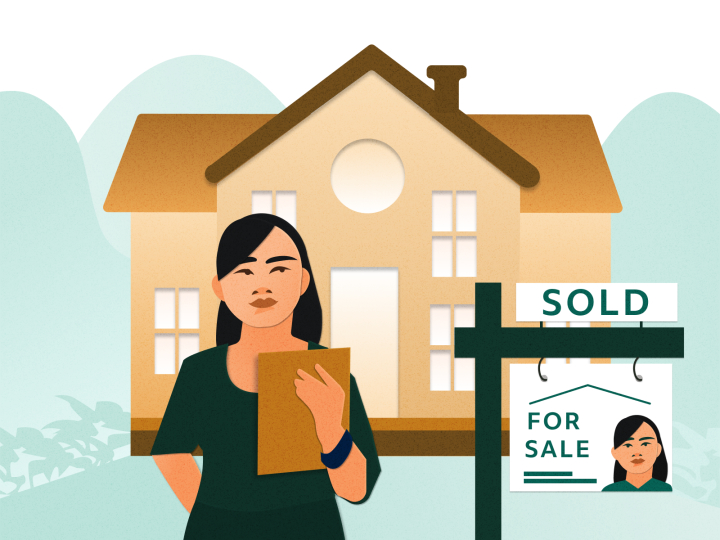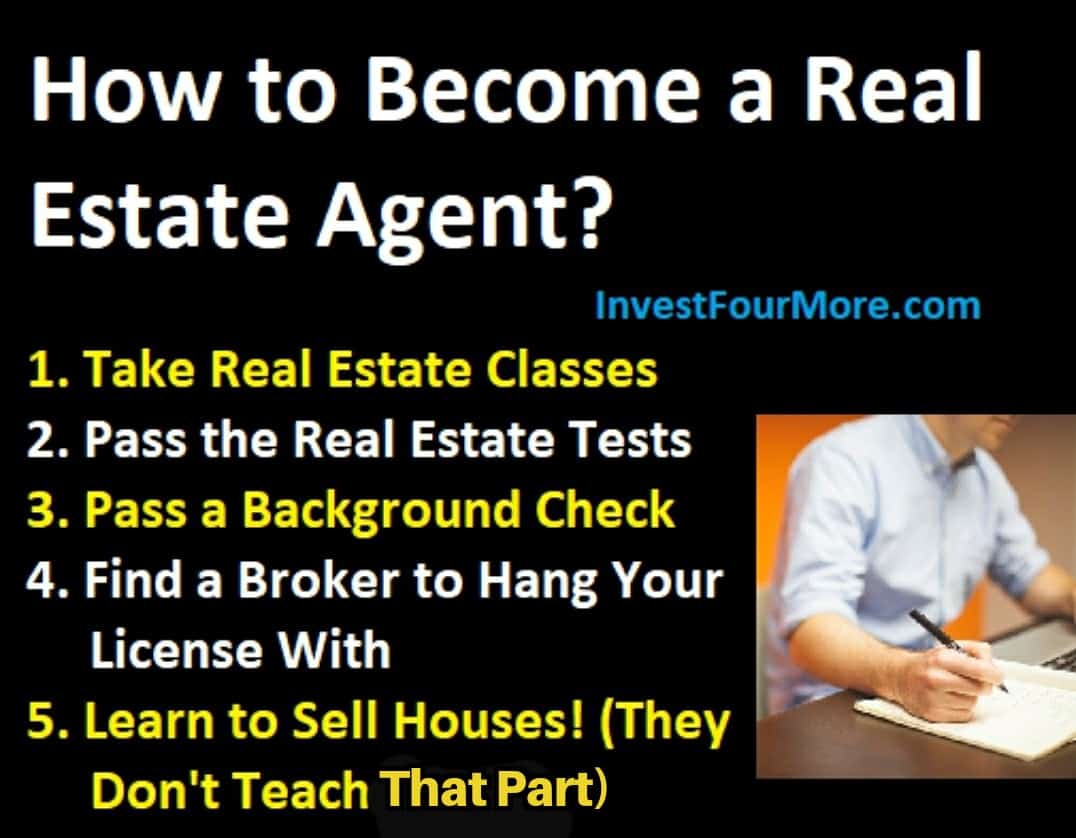To become a real estate agent with no experience, obtain a real estate license and join a reputable brokerage. Take advantage of training and mentorship opportunities.

Starting a career in real estate can seem daunting without prior experience, but it’s entirely possible. The first step is to obtain a real estate license by completing the required coursework and passing the licensing exam. Once licensed, joining a reputable brokerage can provide the guidance and resources needed to succeed.
Many brokerages offer extensive training programs, mentorship, and hands-on learning experiences. Building a network and leveraging social media can also help in gaining traction. Stay committed, keep learning, and focus on providing excellent customer service to establish yourself in the industry.
Introduction To How to Become a Real Estate Agent With No Experience?
Starting a career in real estate can be exciting. If you have no experience, don’t worry. This guide will help you understand the basics. Real estate offers many opportunities for growth. Let’s dive into what real estate is and why agents are important.
What Is Real Estate?
Real estate refers to property consisting of land and buildings. It also includes natural resources like water and minerals. Real estate can be residential, commercial, or industrial.
- Residential real estate: Homes, apartments, and condos.
- Commercial real estate: Office buildings, shops, and malls.
- Industrial real estate: Factories and warehouses.
Real estate is a valuable asset. People invest in it for personal use or profit. Understanding the types of real estate is essential for future agents.
Importance Of Real Estate Agents
Real estate agents play a crucial role. They help people buy, sell, or rent properties. Agents provide expert advice and support.
| Role | Description |
|---|---|
| Advisor | Agents offer market insights and property evaluations. |
| Negotiator | Agents negotiate prices and terms for their clients. |
| Facilitator | Agents handle paperwork and legal processes. |
Agents make the buying and selling process smoother. They ensure that transactions are fair and legal. Becoming a real estate agent means helping people achieve their dreams. It is a rewarding career with many benefits.

Credit: issuu.com
Benefits Of Becoming A Real Estate Agent
Becoming a real estate agent with no experience might seem challenging. Yet, the benefits of becoming a real estate agent are numerous and rewarding. This career offers a variety of perks that can make it a highly attractive option.
Financial Rewards
One of the main benefits is the potential for high financial rewards. As a real estate agent, you earn commissions on sales. These commissions can be substantial, depending on the property value. Here is a simple breakdown:
| Property Value | Commission Rate | Potential Earnings |
|---|---|---|
| $100,000 | 3% | $3,000 |
| $500,000 | 3% | $15,000 |
| $1,000,000 | 3% | $30,000 |
These figures illustrate how lucrative real estate can be. This potential for high earnings is a strong motivator.
Flexible Schedule
Another major benefit is the flexible schedule. Real estate agents often control their own time. This means you can work when it suits you. Here are some advantages of a flexible schedule:
- Work-life balance: Spend more time with family and friends.
- Pursue hobbies: Enjoy activities you love outside of work.
- Reduce stress: Less rigid schedules can lower stress levels.
Flexibility in scheduling can lead to a happier and more fulfilling life.
Meeting Licensing Requirements
Becoming a real estate agent with no experience requires meeting licensing requirements. Each state has its own rules. Understanding these rules is the first step.
Educational Qualifications
Most states require a pre-licensing course. These courses cover real estate basics. They include topics like property ownership, contracts, and ethics.
You can take these courses online or in person. Choose the format that suits you best.
| State | Required Hours |
|---|---|
| California | 135 hours |
| Texas | 180 hours |
| Florida | 63 hours |
Passing The Real Estate Exam
After completing the coursework, you must pass the real estate exam. This exam tests your knowledge of real estate laws and practices.
Here are some tips to prepare for the exam:
- Review course materials thoroughly.
- Take practice exams to assess your knowledge.
- Join a study group to discuss difficult topics.
Passing the exam is crucial. It shows you understand the necessary information to start your career.

Credit: www.indeed.com
Finding The Right Brokerage
Starting your career as a real estate agent with no experience can be challenging. One key step is finding the right brokerage to support you. The right brokerage will provide you with training, resources, and mentorship.
Types Of Brokerages
There are different types of brokerages you can join. Each has its own strengths and weaknesses. Consider the following options:
- Traditional Brokerages: These offer structured training programs and a well-established reputation.
- Franchise Brokerages: These provide brand recognition and extensive resources.
- Boutique Brokerages: These focus on personalized service and niche markets.
- Virtual Brokerages: These operate online and offer flexibility and lower fees.
Questions To Ask
Asking the right questions will help you choose the best brokerage. Consider these questions:
- What training programs do you offer?
- What is the commission split?
- Do you provide leads?
- What technology and tools do you offer?
- Is there a mentorship program?
- What is the office culture like?
Answering these questions will help you find a brokerage that fits your needs. Good luck on your journey to becoming a real estate agent!
Building Your Knowledge Base
Building a solid knowledge base is crucial to becoming a successful real estate agent. Knowing the terminology and understanding market trends will set you apart. Here, we’ll delve into these essential aspects.
Real Estate Terminology
Learning real estate terminology is essential. These terms help you communicate clearly.
- MLS: Multiple Listing Service, a database for property listings.
- Escrow: A third party holds funds until conditions are met.
- Appraisal: An expert’s estimate of a property’s value.
- Closing: The final step in a real estate transaction.
Understanding these terms ensures you sound professional. It also helps in explaining things to clients.
Understanding Market Trends
Market trends change constantly. Knowing them helps you advise clients better.
Here’s how to stay updated:
- Read: Follow real estate blogs and news.
- Attend: Go to seminars and workshops.
- Network: Talk to other agents and industry professionals.
Track local market data. Use tools like:
| Tool | Purpose |
|---|---|
| Realtor.com | Property listings and market stats |
| Zillow | Home value estimates and trends |
| Redfin | Real estate market data |
Understanding these tools helps you provide accurate information to your clients.

Credit: investfourmore.com
Developing Essential Skills
Starting a career in real estate with no experience can be challenging. Yet, developing essential skills can pave the way to success. Key skills include communication and negotiation. Both are crucial for building trust with clients and closing deals.
Communication Skills
Effective communication is vital for a real estate agent. Being clear and concise helps in understanding clients’ needs. Use simple language and avoid jargon. Always listen actively to your clients.
- Active Listening: Pay full attention to clients’ words.
- Clear Speech: Use simple and understandable language.
- Empathy: Show you care about clients’ concerns.
Practice these skills daily to improve. Join a communication workshop if needed. Interact with friends and family to enhance your skills.
Negotiation Techniques
Negotiation is a core skill in real estate. You need to negotiate prices, terms, and conditions. Learning negotiation techniques can help you get better deals for your clients.
- Understand Client Needs: Know what your client wants.
- Research Market: Gather data about current market trends.
- Stay Calm: Keep a cool head during negotiations.
Regular practice can make you a better negotiator. Role-playing with colleagues or friends can be useful. Read books on negotiation to learn new strategies.
Networking And Building Connections
Networking is essential for any real estate agent. With no experience, building connections becomes even more critical. Establishing a robust network can help you gain trust and learn from industry experts.
Joining Real Estate Associations
Real Estate Associations are your best choice for how to become a Real Estate agent with no experience. Joining real estate associations is a great way to start. These groups offer access to experienced professionals and valuable resources.
- National Association of Realtors (NAR): Offers training and certification.
- Local Real Estate Boards: Connects you with local agents.
- Specialty Groups: Focuses on niches like commercial real estate.
Attend meetings and events organized by these associations. Participate in discussions and ask questions. This will help you learn and establish connections.
Utilizing Social Media
How to Become a Real Estate Agent With No Experience, Enhance help with social media. Social media is a powerful tool for networking. Platforms like LinkedIn, Facebook, and Instagram can help you connect with other agents and potential clients.
| Platform | Usage |
|---|---|
| Connect with industry professionals. | |
| Join real estate groups and forums. | |
| Share listings and market updates. |
Post regularly and engage with your audience. Share valuable content to establish yourself as a knowledgeable agent.
Marketing Yourself Effectively
Marketing yourself effectively is essential for success as a real estate agent. With no experience, you must stand out. This requires a strong personal brand and smart use of digital marketing.
Creating A Personal Brand
Your personal brand is how clients perceive you. Consistency is key. Ensure your image, message, and values align across all platforms. Use the following tips to build your personal brand:
- Professional Photo: Use a high-quality, friendly photo.
- Unique Logo: Design a memorable logo that reflects your style.
- Clear Message: Define what makes you unique. Write it down clearly.
- Social Media Profiles: Create profiles on all major platforms.
- Networking: Attend local events and meet other professionals.
Using Digital Marketing
Digital marketing is crucial for reaching potential clients. Use various online tools to boost your visibility.
- Website: Create a professional, easy-to-navigate website.
- SEO: Optimize your website with relevant keywords. This improves search engine ranking.
- Blogging: Write informative blog posts on real estate topics.
- Email Marketing: Collect emails and send newsletters.
- Social Media Ads: Invest in ads on platforms like Facebook and Instagram.
Use these strategies to build your presence online. Effective marketing helps you succeed as a real estate agent with no experience.
Continuing Education And Growth
Starting as a real estate agent with no experience can be tough. Continuing education is crucial for your growth in this field. Learning new skills helps you stay competitive. It also keeps you updated with industry trends. This section covers key areas that can boost your career.
Attending Workshops
Workshops provide hands-on learning opportunities. They cover various topics like sales techniques, negotiation skills, and market analysis. Here are some benefits of attending workshops:
- Interactive learning with experts
- Networking with peers
- Practical exercises
- Immediate feedback
Look for workshops hosted by reputable organizations. Aim to attend at least one workshop per quarter. This will help you stay updated and improve your skills.
Pursuing Advanced Certifications
Advanced certifications show your commitment to your career. They also make you more marketable. Below is a table of some valuable certifications:
| Certification | Focus Area |
|---|---|
| Certified Residential Specialist (CRS) | Residential sales |
| Accredited Buyer’s Representative (ABR) | Buyer Representation |
| Graduate, REALTOR® Institute (GRI) | Overall real estate knowledge |
| Certified Commercial Investment Member (CCIM) | Commercial real estate |
Pursue certifications that align with your career goals. These credentials not only enhance your skills but also build your credibility.
Overcoming Initial Challenges
Starting a career as a real estate agent with no experience can be tough. New agents face many challenges. Overcoming these obstacles is key to success. Let’s explore two major challenges: handling rejections and staying motivated.
Handling Rejections
Rejection is part of the real estate business. Not every client will choose you. Learn to handle rejections with grace.
- Stay positive. Each rejection is a lesson.
- Ask for feedback. Know why they said no.
- Improve your skills. Use feedback to get better.
Remember, every “no” brings you closer to a “yes”. Keep moving forward.
How to Become a Real Estate Agent With No Experience: Staying Motivated
Staying motivated is crucial in the real estate industry. Motivation drives success. Here are some tips:
- Set small goals. Achieving them boosts confidence.
- Celebrate successes. Even small wins matter.
- Join a support group. Share experiences and advice.
Track your progress. Keep a journal of your achievements. This helps you stay focused and motivated.
Conclusion
How to Become a Real Estate Agent With No Experience and No Degree? Becoming a real estate agent with no experience is achievable. Focus on education, networking, and gaining practical knowledge. Leverage online resources and mentorship to build your skills. Stay committed, and your efforts will pay off. Start your journey today and transform your career in real estate.
Success is within reach with dedication and hard work.






